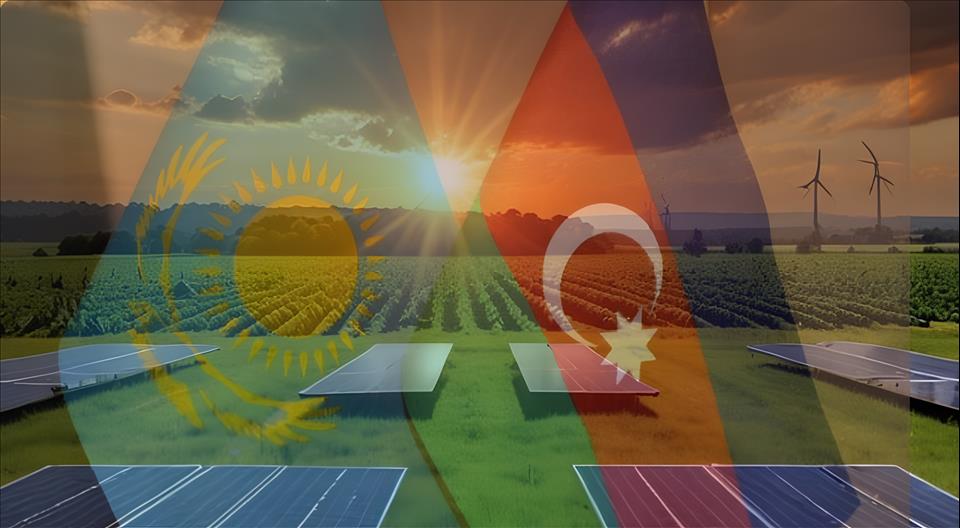
Azerbaijan, Kazakhstan Lead Shift From Bilateral Energy Ties To Regional Green Integration
In a world increasingly driven by clean energy ambitions, Azerbaijan is positioning itself not merely as a producer or transit country-but as a regional architect of green energy connectivity. Its recent high-level engagements in Kazakhstan underscore a critical dimension of this strategy: leveraging partnerships with Central Asian countries to construct a multi-vector, sustainable energy corridor between East and West.
During "Kazakhstan Energy Week" in Astana, Azerbaijan's Minister of Energy, Parviz Shahbazov, held a series of strategic meetings with Kazakh officials and international energy leaders. The agenda was clear: deepen bilateral and multilateral cooperation in green energy, enhance trans-Caspian energy connectivity, and accelerate joint regional infrastructure initiatives aimed at transforming the Caspian basin into a pivotal green energy corridor.
Azerbaijan's energy transition is not simply about replacing fossil fuels. It's about ensuring long-term geopolitical relevance in a shifting energy landscape. As global markets move beyond hydrocarbons, countries that control the flow of clean energy will command new forms of influence. By integrating itself into Central Asia's renewable energy ambitions, Baku is ensuring that Azerbaijan remains at the center of the evolving Eurasian energy map.
This strategy is most visible in the "Central Asia-Azerbaijan Green Energy Corridor," a project that seeks to connect renewable energy-rich countries like Kazakhstan and Uzbekistan to European markets via Azerbaijan. The initiative is more than a pipeline-it is a power bridge, combining electricity interconnectors, green hydrogen potential, and fiber-optic infrastructure that also supports digital transformation.
During his speech at the APRECA Ministerial Roundtable, Shahbazov emphasized that this corridor represents not only a technical solution but a strategic transformation. "The creation of the geostrategic Trans-Caspian Green Energy Corridor, which will connect the electricity systems of our countries for the first time in history, is fully consistent with the policy priorities of President Ilham Aliyev," Shahbazov said. "It opens up broad opportunities for the development of the Middle Corridor as a green bridge connecting Europe with Asia and China through the Caspian Sea."
The traditional Azerbaijan-Kazakhstan energy partnership, long centered around hydrocarbons, is evolving. While Kazakh oil continues to be shipped through the Baku-Tbilisi-Ceyhan (BTC) pipeline-with 3.38 million tons transported since 2023-both sides are clearly pivoting toward long-term green cooperation.
In meetings with Kazakhstan's Minister of Energy Erlan Akkenzhenov and Minister of Transport Nurlan Sauranbayev, discussions moved beyond oil logistics to include infrastructure modernization, the feasibility study of the green energy corridor (expected to launch in November), and the future role of the Zangezur Corridor and Middle Corridor in supporting green energy trade.
Kazakhstan's full backing for the green energy corridor was made explicit by Minister Akkenzhenov, who reiterated Astana's support for this "strategically important project," underscoring its alignment with both countries' long-term energy diversification goals.
Azerbaijan is not acting alone. Its coordination with Kazakhstan and Uzbekistan under the Caspian Green Energy Corridor initiative-formalized in April 2025-is a model of regional green diplomacy. Backed by the Asian Development Bank (ADB) and Asian Infrastructure Investment Bank (AIIB), the tripartite agreement aims to interconnect the energy systems of all three countries and create a viable, scalable route for clean energy exports to Europe.
The groundwork was laid during the COP29 summit in Baku in 2024,
where the leaders of the three countries signed a landmark
strategic agreement on green energy. Today, the partnership is
being operationalized with feasibility studies, stakeholder
engagement, and alignment with broader initiatives like APRECA
(Accelerated Partnership for Renewable Energy in Central Asia),
coordinated by the International Renewable Energy Agency
(IRENA).
In a meeting with IRENA Director General Francesco La Camera,
Azerbaijan reaffirmed its commitment to aligning its national and
regional initiatives with global decarbonization goals,
particularly in developing shared infrastructure, energy storage
systems, and smart grids.
Traditionally viewed as a transport and trade route connecting China to Europe via Central Asia and the South Caucasus, the Middle Corridor is now being redefined as a "green corridor." With Azerbaijan's leadership, the region is exploring how electricity interconnectors, renewable power flows, and even fiber-optic data lines can turn this transport route into a full-spectrum infrastructure artery.
Incorporating the Zangezur Corridor into this architecture adds another layer of strategic depth. By strengthening east-west logistics while embedding clean energy systems into transport frameworks, Azerbaijan is turning geography into long-term advantage.
Moreover, Azerbaijan is also pursuing parallel routes for green energy export, such as the Caspian-Black Sea-Europe, Azerbaijan-Turkiye-Europe, and Azerbaijan-Georgia-Turkiye-Bulgaria corridors. These initiatives reflect a deliberate strategy of diversification-not only in energy sources but in partnerships and export pathways.
Azerbaijan's green energy diplomacy with Kazakhstan-and the broader Central Asian region-is a case study in how energy transitions can be strategically leveraged for regional influence, economic diversification, and geopolitical security.
As global energy systems become increasingly decarbonized and interconnected, Azerbaijan's proactive efforts to lead, connect, and innovate in the Caspian region position it as a central node in Eurasia's energy future. What began as a fossil-fuel transit hub is rapidly becoming a linchpin of green energy geopolitics.
With the support of international financial institutions, alignment with global sustainability goals, and a growing network of strategic partnerships, Azerbaijan is not just adapting to the energy transition-it is shaping it.
Legal Disclaimer:
MENAFN provides the
information “as is” without warranty of any kind. We do not accept
any responsibility or liability for the accuracy, content, images,
videos, licenses, completeness, legality, or reliability of the information
contained in this article. If you have any complaints or copyright
issues related to this article, kindly contact the provider above.


















Comments
No comment